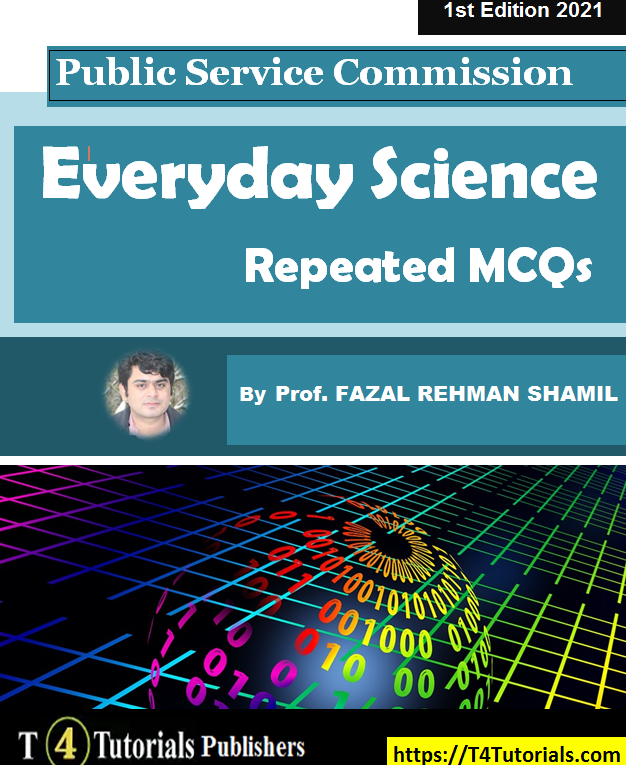1. Basic Scientific Concepts MCQs in Everyday Science [General]
- Scientific method and its application MCQs in Everyday Science
- Measurements and units MCQs in Everyday Science
- Importance of observation and experimentation MCQs in Everyday Science
2. Physics in Daily Life MCQs in Everyday Science
- Laws of motion and their everyday applications MCQs in Everyday Science
- Energy: forms, conservation, and conversion MCQs in Everyday Science
- Light, optics, and everyday phenomena (e.g., rainbows, vision) MCQs in Everyday Science
- Electricity and magnetism (e.g., household electrical systems, magnets) MCQs in Everyday Science
- Heat, temperature, and thermodynamics MCQs in Everyday Science
- Sound and acoustics MCQs in Everyday Science
3. Chemistry in Everyday Life MCQs in Everyday Science
- States of matter: solids, liquids, gases MCQs in Everyday Science
- Chemical reactions and everyday examples (e.g., cooking, rusting) MCQs in Everyday Science
- Acids, bases, and salts in daily use MCQs in Everyday Science
- Water and its properties MCQs in Everyday Science
- Air, its composition, and pollution MCQs in Everyday Science
- Organic and inorganic substances MCQs in Everyday Science
4. Biology in Daily Life MCQs in Everyday Science
- Human body systems and health (e.g., digestion, respiration, circulation) MCQs in Everyday Science [General] MCQs in Everyday Science [General]
- Nutrition and diet MCQs in Everyday Science [General]
- Diseases, immunity, and vaccinations MCQs in Everyday Science [General]
- Plants and their importance (e.g., photosynthesis, food chains) MCQs in Everyday Science [General]
- Genetics and heredity MCQs in Everyday Science [General]
- Ecology and environment: conservation, pollution, and climate change MCQs in Everyday Science [General]
5. Earth and Space Sciences
- Structure and composition of Earth MCQs in Everyday Science [General]
- Natural resources and their conservation MCQs in Everyday Science [General]
- Weather, climate, and meteorology MCQs in Everyday Science [General]
- Astronomy: solar system, stars, and galaxies MCQs in Everyday Science [General]
- Natural disasters (e.g., earthquakes, volcanoes, tsunamis) MCQs in Everyday Science [General]
6. Environmental Science MCQs in Everyday Science [General]
- Ecosystems and biodiversity MCQs in Everyday Science [General]
- Human impact on the environment MCQs in Everyday Science [General]
- Renewable and non-renewable energy resources MCQs in Everyday Science [General]
- Sustainable development and green technologies MCQs in Everyday Science [General]
- Waste management and recycling MCQs in Everyday Science [General]
7. Technology in Everyday Life MCQs in Everyday Science [General]
- Role of computers and the internet MCQs in Everyday Science [General]
- Modern communication technologies MCQs in Everyday Science [General]
- Applications of biotechnology MCQs in Everyday Science [General]
- Advancements in transportation and energy systems MCQs in Everyday Science [General]
- Smart technologies and their impact MCQs in Everyday Science [General]
8. Health and Medicine MCQs in Everyday Science [General]
- Basic principles of hygiene and sanitation MCQs in Everyday Science [General]
- Common medicines and their uses MCQs in Everyday Science [General]
- Vaccinations and their importance MCQs in Everyday Science [General]
- Public health and disease prevention MCQs in Everyday Science [General]
- Mental health awareness MCQs in Everyday Science [General]
9. Scientific Innovations MCQs in Everyday Science [General]
- Historical scientific discoveries MCQs in Everyday Science [General]
- Role of science in technological advancements MCQs in Everyday Science [General]
- Future trends in science and technology MCQs in Everyday Science [General]
Here, I am sharing with you some of the very important and repeated MCQs of General Knowledge. These MCQs frequently asked in past papers.
Solved MCQs of Everyday Science in PDF(Questions Answers).
49
Score: 0
Attempted: 0/49
Subscribe
- Everyday Science MCQs
- Everyday Science Multiple Choice Questions
- Everyday Science MCQs pdf
- Everyday Science MCQs with Answers
- Everyday Science MCQs PPSC
- Everyday Science MCQs FPSC
- Everyday Science MCQs Past Papers
- NTS Everyday Science MCQs
- Important MCQs Everyday Science
- 10,000+ General Knowledge MCQs
